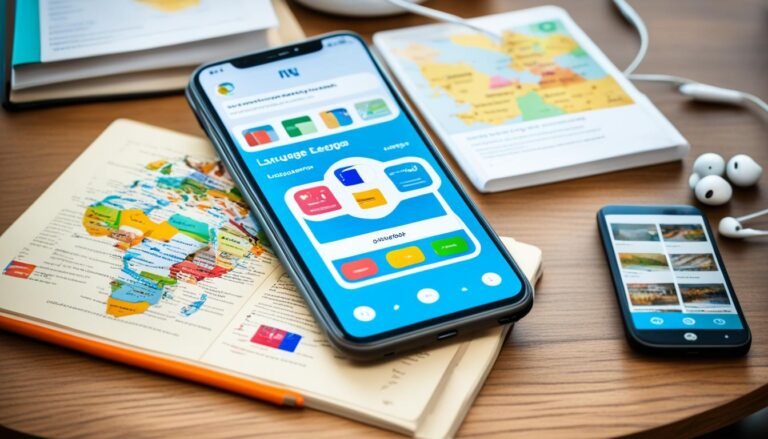How to Make Money with a Travel App
Are you interested in turning your travel app into a profitable venture? Wondering how to monetize your app and generate income? Look no further. In this article, we will explore the various strategies and income sources that can help you maximize your earnings with a travel app. From commission fees to in-app ads and premium versions, we’ll uncover the secrets to success in the world of travel app monetization.
Key Takeaways:
- Create a steady income stream with commission fees from listed services.
- Monetize your travel app through in-app ads, targeting relevant and useful advertisements.
- Utilize the merchant model to resell booking services and increase profit margins.
- Offer a premium version of your app with enhanced features and the removal of ads.
- Implement in-app purchases to provide additional services and exclusive listings.
Earn Commission Fees from Listed Services
One way to make money with a travel app is by taking a commission from the services listed on the app. By charging a small fee to accommodation hosts or hotels for being featured on the app, you can generate revenue and provide them with a steady flow of customers without the need for additional advertising. This model benefits both the app and the service providers, as it allows you to monetize your travel app while helping providers maximize their reach and bookings.
When travelers use your app to search for accommodations or other services, they have access to a curated list of options that have been vetted and approved by your team. This not only enhances the user experience but also gives service providers a better chance of being noticed by potential customers.
Implementing a commission-based revenue model in your travel app offers several advantages. Firstly, it provides a tangible incentive for service providers to join your platform, as they only pay when they receive business through your app. Secondly, as your user base grows, the number of bookings and transactions will increase, allowing you to earn a consistent stream of commission fees.
To illustrate the potential commission fees that can be earned, consider the following fictional example:
| Service | Commission Fee | Monthly Bookings | Estimated Monthly Revenue |
|---|---|---|---|
| Hotel Bookings | 7% | 500 | $10,500 |
| Tour Packages | 5% | 300 | $4,500 |
| Transportation | 3% | 200 | $1,800 |
*Note: The figures above are for illustrative purposes only and may vary based on the specific circumstances and revenue-sharing agreements.
By incorporating commission fees into your travel app’s revenue model, you can earn money while providing valuable services to both travelers and service providers. The key to success in this model lies in creating a user-friendly app with a wide range of listed services that align with the needs and preferences of your target audience.
Monetize with In-App Ads
Another option for generating income with a travel app is through in-app ads. While ads can sometimes be seen as annoying for users, they can be a quick and effective way to monetize the app. By strategically incorporating relevant and useful ads, you can generate profits while enhancing the user experience.
When choosing in-app ads for your travel app, it’s important to consider the relevance to the app’s topic and the value they provide to users. For example, a flight booking app could feature ads for car rental services or travel gear stores, offering users additional information and resources related to their travel needs.
It’s crucial to strike a balance between revenue generation and user experience. Here are a few tips to ensure a successful implementation of in-app ads:
- Targeted Advertising: Choose ads that align with the interests and needs of your app’s users. This will increase the chances of engagement and conversions.
- Non-Intrusive Placement: Opt for ad placements that don’t disrupt the user’s flow or cause frustration. Well-integrated ads that complement the app’s design and functionality are more likely to be well-received.
- Frequency Control: Avoid bombarding users with excessive ads. Implement frequency capping to set a limit on the number of ads displayed within a specific time frame.
- Data Analysis: Regularly analyze user data to gain insights into their preferences and behaviors. This will help you refine your ad selection and placement strategies to maximize monetization and user satisfaction.
In-app ads have the potential to significantly contribute to the monetization of your travel app. However, it’s crucial to maintain a balance between revenue generation and user experience. By carefully selecting relevant ads and implementing effective strategies, you can successfully monetize your travel app without compromising user satisfaction.
Utilize the Merchant Model
The merchant model is a popular way to monetize a travel app. This strategy involves stocking booking services, such as hotel rooms, bus tickets, or guided tours, and reselling them to users at a higher price, thereby earning a profit.
By purchasing services directly from providers and buying in bulk, the app can negotiate lower prices, increasing potential profit margins. This model allows the app to offer a wide range of services to users, providing convenience and a one-stop solution for their travel needs.
Implementing the merchant model in a travel app opens up opportunities for partnerships with various service providers, including hotels, transportation companies, and tour operators. By partnering with trusted brands, the app can build credibility and attract more users.
Additionally, the merchant model allows for flexibility in pricing and marketing strategies. The app can create exclusive deals and packages for users, enticing them to choose the app for their travel bookings. This approach gives the app a competitive edge in the market.
Here is an example of how the merchant model can be implemented in a travel app:
| Service | Price (Provider) | Resale Price (App) | Profit |
|---|---|---|---|
| Hotel Room | $100 | $120 | $20 |
| Bus Ticket | $50 | $60 | $10 |
| Guided Tour | $200 | $240 | $40 |
In this example, the app purchases hotel rooms, bus tickets, and guided tours from providers at discounted prices and resells them to users at higher prices. The difference between the purchase price and resale price represents the profit earned by the app.
The merchant model is a lucrative option for travel app monetization as it capitalizes on the demand for booking services. It allows the app to generate revenue while providing users with a seamless and convenient booking experience.
Offer a Premium Version
When it comes to app monetization, offering a premium version can be a highly effective strategy for travel apps. By providing additional features and functionality in a paid version of the app, you can entice users to upgrade and generate revenue.
With a premium version, you can offer users a choice between a free version with limited features and a paid version with enhanced capabilities. This allows you to cater to different user preferences and budgets, while providing an incentive for users to unlock the full potential of your travel app.
By offering a premium version, you can provide users with a more comprehensive and immersive experience. This may include access to exclusive travel content, advanced search filters, personalized recommendations, offline mode, or other exciting features that enhance their travel planning and booking process.
In addition to unlocking additional features, the premium version can also be an opportunity to improve the overall user experience. One key benefit is the removal of in-app ads, allowing users to enjoy a seamless and uninterrupted travel app experience without distractions.
When implementing a premium version, it is important to carefully consider the value proposition you offer to users. Highlight the unique benefits and advantages of upgrading, ensuring that the additional features are truly valuable and enhance the user’s travel experience.
“By offering a premium version, you not only open up new revenue streams but also create a win-win situation for your users. They get access to enhanced features and a more tailored experience, while you generate income to further develop and improve your travel app.”
By providing a premium version of your travel app, you can diversify your revenue streams and maximize your app’s earning potential. It’s essential to strike a balance between the features offered in the free version and the premium version, ensuring that users see the value in upgrading while still providing a valuable experience for those who choose to use the free version.
With the right combination of features and pricing, offering a premium version can be a lucrative app monetization strategy for your travel app.
| Benefits of a Premium Version | Free Version | Premium Version |
|---|---|---|
| Access to exclusive travel content | Limited | ✓ |
| Advanced search filters | Limited | ✓ |
| Personalized recommendations | Limited | ✓ |
| Offline mode | Limited | ✓ |
| Removal of in-app ads | ✓ | ✓ |
Implement In-App Purchases
In-app purchases are a valuable tool for monetizing travel apps and enhancing revenue streams. By offering users the option to purchase additional features or services within the app, you can provide a personalized and customizable experience while generating income.
Instead of opting for a premium plan, users can choose to buy specific features or services separately, tailoring their experience to their individual needs. This flexibility allows for a more targeted approach to monetization, catering to the preferences and desires of your user base.
For example, a booking app could provide the opportunity to purchase access to exclusive listings, giving users access to premium accommodations or unique travel experiences. This not only generates revenue through the purchase itself but also increases the perceived value of the app, attracting more users and potential customers.
In addition to exclusive listings, travel apps can also offer the option to buy offline services. Travelers often face challenges with connectivity while on the go, and offline services such as language translation or local attraction recommendations can greatly enhance the travel experience. By providing these services as in-app purchases, you can cater to the needs of your users and generate additional revenue.
Implementing in-app purchases requires thoughtful consideration and planning. It is important to identify the additional features and services that align with your app’s value proposition and target audience. By understanding the pain points and desires of your users, you can create in-app purchase options that truly enhance their travel experience.
| Benefits of Implementing In-App Purchases for Travel Apps |
|---|
| 1. Diversify Revenue Streams |
| 2. Personalize the User Experience |
| 3. Increase App Value and Appeal |
| 4. Address Connectivity Challenges with Offline Services |
| 5. Attract and Retain More Users |
Implementing in-app purchases can be a win-win situation for both the app developer and the users. By providing valuable additional features and services through in-app purchases, you can generate revenue while enhancing the overall travel experience. Remember to always consider the needs and preferences of your target audience and continuously optimize and refine your in-app purchase options to maximize income and user satisfaction.
The Potential of Travel App Monetization
After developing a travel app, it is important to consider the various monetization options available. By utilizing a combination of commission fees, in-app ads, the merchant model, a premium version, and in-app purchases, travel apps have the potential to generate significant revenue. It is essential to assess which monetization strategies align best with the app’s target audience and goals.
Commission Fees from Listed Services
One effective way to generate income with a travel app is by taking commission fees from the services listed on the app. This model allows the app to earn a percentage of revenue from accommodation providers, tour operators, or transportation services that are listed and booked through the app. It is a win-win situation as the app helps these businesses reach a wider audience while generating its own profit.
In-App Ads for Additional Revenue
Incorporating in-app ads is another viable option for travel app monetization. By displaying relevant ads from travel-related businesses, such as airlines, hotels, or travel gear companies, the app can earn revenue every time users interact with the advertisements. However, it is crucial to strike a balance between generating income and maintaining a positive user experience, ensuring that the ads do not disrupt or annoy users.
The Merchant Model for Profit Generation
Utilizing the merchant model is a popular strategy for making money with a travel app. This involves partnering with service providers and directly offering their services through the app, generating profit through markup or reselling the services at a higher price. By establishing partnerships with providers and negotiating favorable terms, the app can increase its profit potential while providing users with a convenient booking platform.
Premium Version with Enhanced Features
Offering a premium version of the travel app can be an effective way to generate revenue. By providing users with additional features and functionalities, the app can entice them to upgrade to the paid version. This premium version may include exclusive content, advanced search filters, or enhanced customer support. Additionally, offering users the option to remove in-app ads is a desirable incentive for monetization.
In-App Purchases for Added Value
Implementing in-app purchases can significantly contribute to the revenue generated by a travel app. By offering users the ability to purchase additional features or services within the app, such as access to exclusive listings, offline functionality, or premium content, the app can cater to individual preferences and provide a personalized experience. In-app purchases provide users with added value while contributing to the app’s overall income.
Overall, the profit potential of travel app monetization is vast. By strategically implementing a combination of commission fees, in-app ads, the merchant model, a premium version, and in-app purchases, travel apps can create diverse and sustainable income sources. However, it is essential to carefully evaluate the target audience, app goals, and market trends to choose the most suitable monetization strategies that maximize revenue generation.
| Monetization Strategy | Key Benefits | Considerations |
|---|---|---|
| Commission Fees from Listed Services | – Earn revenue from service providers – Increase exposure for listed businesses |
– Attracting and retaining quality service providers – Balancing commission rates to remain competitive |
| In-App Ads | – Additional income stream – Broaden brand partnerships |
– Maintaining user experience – Selecting relevant and non-intrusive ads |
| The Merchant Model | – Greater profit margins – Direct control over service offerings |
– Establishing partnerships with reliable providers – Negotiating competitive pricing |
| Premium Version | – Increased revenue per user – Exclusive features and content |
– Balancing between free and premium offerings – Ensuring added value justifies the cost |
| In-App Purchases | – Additional revenue from individual purchases – Tailoring services to user preferences |
– Offering enticing and relevant in-app purchases – Ensuring transparency and clear value proposition |
The Growing Market for Travel Apps
The travel app market is witnessing significant growth, driven by the increasing demand for convenient and user-friendly solutions in the travel industry. With the rise of mobile technology and the convenience it offers, more travelers are turning to mobile travel apps for their trip planning and booking needs.
Revenue projections for the travel industry are promising, with an expected reach of billions of dollars by 2022. This projection highlights the immense potential and profitability of the travel app market, making it an attractive venture for entrepreneurs and businesses looking to tap into the travel industry’s growth.
In recent years, there has been a steady increase in the number of travelers using mobile travel apps. These apps provide a range of services, including flight and hotel bookings, itinerary planning, real-time updates, and local recommendations, all at the users’ fingertips.
The Benefits of Mobile Travel Apps
Mobile travel apps offer several advantages that contribute to their growing popularity:
- Convenience: Travelers can access all their travel-related information, make bookings, and manage their itineraries from a single app on their mobile devices.
- Real-time Updates: Apps provide real-time notifications and updates, keeping travelers informed about changes in flight schedules, gate changes, and other essential travel information.
- Personalization: Travel apps offer personalized recommendations based on user preferences, making it easier for travelers to discover new destinations, attractions, and activities.
- Time and Cost Savings: By streamlining the booking process and offering competitive deals, travel apps help users save both time and money when planning their trips.
With the growing market for travel apps, developing a successful app can lead to long-term profitability and recognition in the industry. However, competition in the travel app market is fierce, requiring innovative features, a seamless user experience, and effective marketing strategies to stand out and attract users.
| Key Factors | Benefits |
|---|---|
| Market Growth | Potential for significant revenue generation |
| Convenience | Effortless access to travel-related services and information |
| Personalization | Customized recommendations enhance user experience |
| Time and Cost Savings | Efficient trip planning and cost-effective bookings |
As technology continues to advance and travelers become increasingly reliant on mobile apps, the demand for travel apps is expected to grow further. Entrepreneurs and businesses in the travel industry should seize this opportunity to develop innovative and user-centric travel apps that cater to the evolving needs of modern travelers.
“The travel app market holds immense potential for revenue generation, with the increasing number of travelers relying on mobile apps for their trip planning and bookings.”
Conclusion
In conclusion, travel app monetization offers profitable ventures for app developers looking to generate income and maximize earnings. By implementing successful strategies such as commission fees, in-app ads, the merchant model, a premium version, and in-app purchases, travel apps can create a steady income stream.
Understanding the market, target audience, and competition is essential in creating a successful and profitable travel app. By carefully selecting monetization options that align with user needs and preferences, travel app developers can optimize revenue generation.
Travel app monetization is a dynamic field, and there is no one-size-fits-all approach. Developers must constantly evaluate and adapt their strategies to stay competitive in the market. By staying up to date with industry trends and continually refining their monetization techniques, app developers can unlock the full potential of their travel apps and achieve long-term success.







